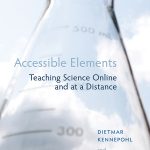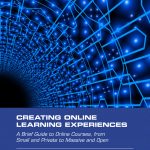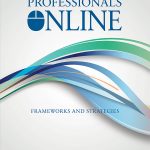Teaching Online
Open Textbooks
12 Key Ideas: An Introduction to Teaching Online Understanding the internet as platform / CC BY
Dave Cormier and Ashlyne O’Neil / University of Windsor/2020
This book is meant to be a short course to help you prepare to move your teaching online. Do a chapter a day. Or just pick the ones you like.
Format: Pressbooks
Accessible Elements: Teaching Science Online and at a Distance / CC BY-NC-ND 2.5 CA
Edited by: Dietmar Kennepohl and Lawton Shaw, Athabasca University
 Current practices in online and distance education: distance-delivered methods for laboratory coursework, the requisite administrative and institutional aspects of online and distance teaching, and the relevant educational theory.
Current practices in online and distance education: distance-delivered methods for laboratory coursework, the requisite administrative and institutional aspects of online and distance teaching, and the relevant educational theory.
Format: Free PDF
Creating Online Learning Experiences / CC BY-NC
Matt Crosslin, et al. / University of Texas at Arlington / 2018
 This book provides an updated look at issues that comprise the online learning experience creation process. As online learning evolves, the lines and distinctions between various classifications of courses has blurred and often vanished. Classic elements of instructional design remain relevant at the same time that newer concepts of learning experience are growing in importance. However, problematic issues new and old still have to be addressed. This handbook explores many of these topics for new and experienced designers alike, whether creating traditional online courses, open learning experiences, or anything in between.
This book provides an updated look at issues that comprise the online learning experience creation process. As online learning evolves, the lines and distinctions between various classifications of courses has blurred and often vanished. Classic elements of instructional design remain relevant at the same time that newer concepts of learning experience are growing in importance. However, problematic issues new and old still have to be addressed. This handbook explores many of these topics for new and experienced designers alike, whether creating traditional online courses, open learning experiences, or anything in between.
Format: Pressbooks
Democratizing Online Learning in Postsecondary Education: Instructional Design Plans/ CC BY-NC-SA
Edited by Robert McGray / eCampus Ontario / 2020
The instructional design plans in this volume were peer reviewed through a double-blind process.
Format: Pressbooks
Designing and Developing High Quality Student-Centred Online/Hybrid Learning Experiences / CC BY
eCampusOntario / 2022
This collaborative project between Seneca College, Humber College, Kenjgewin Teg, Trent University and Nipissing University provides learners with the knowledge and skills to design, develop and deliver high-quality, interactive, and engaging online learning experiences.
Format: Pressbooks
Engaging the Online Learner: Advanced Methods for Creating Meaningful and Effective Learning Experiences / CC BY-NC-SA
Irameet Kaur and Mike Harttrup / eCampus Ontario / 2022
Foundations, strategies, and tactics for igniting and engaging online learners .
Format: Pressbooks
Facilitating Learning Online / CC BY-NC-SA
Joerdis Weilandt and Kristi Thomas / KPU / 2022
This digital textbook contains five chapters with scaffolded learning activities that encourage you to explore the most important aspects of facilitating academic online courses and/ or modules.
Format: Pressbooks
Fit for Online Learning: Your Handbook to Teaching Online / CC BY-NC-SA
U of L Teaching Centre / 2020
The Fit for Online Learning course is designed as an initial stepping stone to build the comprehensive set of digital competencies required to create and facilitate meaningful academic learning experiences for your online students.
Format: Pressbooks. Contains H5P.
High Quality Online Courses: How to Improve Course Design & Delivery for your Post-Secondary Learners / CC BY-NC
University of Waterloo; Queen’s University; University of Toronto; and Conestoga College / 2022
This course is designed for educators in postsecondary education (PSE). The goal of this course is to enable you to apply principles of quality design to your online course, whether you’re creating a new online course, revising an existing online or remote course, or facilitating your first-ever online course.
Format: Pressbooks
Online Course Development: Creating Robust Educational Experiences Online / CC BY-NC-SA
Emily Ballantyne / MSVU /2022
This resource guide is designed to help course developers plan the design of their online course from a student-centred perspective. It is a development guide, meaning that it will help you lay the foundation you need to find success with designing a course for an online context. It is meant to be used at the planning stage of the process, before you formally start your design. After working through the resource, you should have the foundational outline and plan you need to start developing a course in your learning management system.
Format: Pressbooks
Online ISW Modules: Your interactive guide through the Online ISW / CC BY-NC-SA
Ashlyne O’Neil and Pierre Boulos / University of Windsor / 2021
Intended as a resource to supplement your ISW manual and engage you in the asynchronous components of our 4-week workshop. Weekly sections will be made available on a rolling basis .
Format: Pressbooks
#Openteach: professional development for open online educators / CC BY
Orna Farrell; James Brunton; Caitriona Ni She; and Eamon Costello / Openteach / 2021
The book’s stated goal is to share the knowledge, resources and research generated by the #Openteach project. The aim of the project was to create an evidence-based and open professional learning approach to support educators to teach online.
Format: Pressbooks
Remote Teaching: A Guide for Teaching Assistants / CC BY
By: Meredith Allen, Alisha Szozda, Jeremy Kerr, and Alison Flynn, University of Ottawa
This guide is designed to help you effectively and confidently work as a teaching assistant in a remote teaching environment.
Format: Pressbooks
Remote Teaching: A Practical Guide with Tools, Tips, and Techniques / CC BY
Alison Flynn and Jeremy Kerr / University of Ottawa
This resource is designed to help you convert your face-to-face class to a remote course as simply as possible. We walk you through the process, at each step giving a suggestion for a specific tool/technology—the uOttawa-supported one and our preferred tool if it is different. We also give an example and sources of additional information. We also created a template of a course in Brightspace, syllabus, and other resources that you can modify to suit your own course, if desired.
Format: Pressbooks
Teaching Health Professionals Online / CC BY-NC-ND 2.5 CA
By: Sherri Melrose, Caroline Park, and Beth Perry, Athabasca University
 Teaching Health Professionals Online is a must-read for professionals in the health care field who strive to deliver excellence in their online classes. Intended for a wide range of professionals, including nurses, social workers, occupational and radiation therapists, chiropractors, dietitians, and dental hygienists, this compendium of teaching strategies will inspire both new and experienced instructors in the health professions. In addition to outlining creative, challenging activities with step-by-step directions and explanations of why they work, each chapter in the text situates practice within the context of contemporary educational theories such as instructional immediacy, invitational theory, constructivism, connectivism, transformative learning, and quantum learning theory.
Teaching Health Professionals Online is a must-read for professionals in the health care field who strive to deliver excellence in their online classes. Intended for a wide range of professionals, including nurses, social workers, occupational and radiation therapists, chiropractors, dietitians, and dental hygienists, this compendium of teaching strategies will inspire both new and experienced instructors in the health professions. In addition to outlining creative, challenging activities with step-by-step directions and explanations of why they work, each chapter in the text situates practice within the context of contemporary educational theories such as instructional immediacy, invitational theory, constructivism, connectivism, transformative learning, and quantum learning theory.
Format: Pressbooks
Telfer Guide to Online Teaching / CC BY-NC
mdias / Telfer School of Management / 2021
This guide was developed in response to the transition to remote teaching in the fall 2020. It provides course design, instructional techniques and assessment strategies for online teaching.
Format: Pressbooks
Low Bandwidth Teaching and Learning / CC BY
Kyle Mackie
Shifting to remote teaching and learning brings with it a number of considerations and challenges. If learners are able to connect to free/institutional networks (e.g., from local libraries, or on-campus student work areas), they will likely be able to access a safe, reliable, and robust internet connection. However, if these learners are relying on home-based connections, these will likely have a slower speed connection, and their service may be shared with others in their house (for work, or education, or entertainment). While we’re considering activities that lower the bandwidth, it’s also to have a refresher on how to optimize images, PDFs, etc. for effective distribution before you post them to your LMS or send them via email.
Format: Pressbooks
Using Game-Based Learning Online – A Cookbook of Recipes / CC BY-NC-SA
The EGG / eCampus Ontario / 2020
Game-based learning is a teaching approach that uses different forms of games, and the strategies or mechanics associated with them, for educational purposes. It advocates a student-centred approach that allows learners to explore, fail and take up challenges in a safe environment.
Format: Pressbooks

